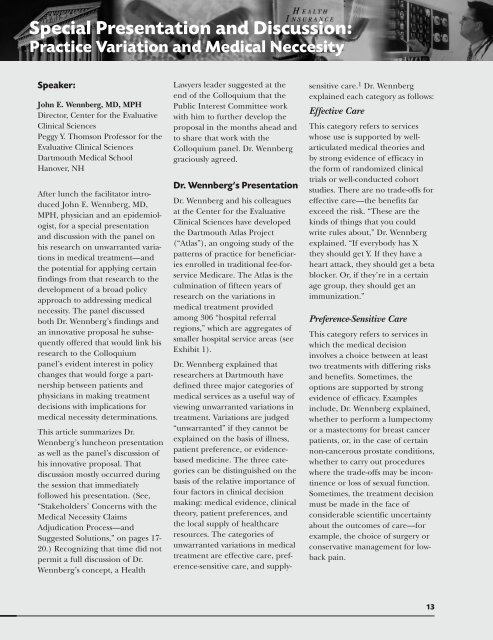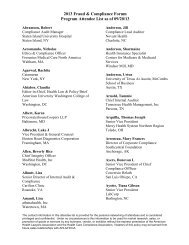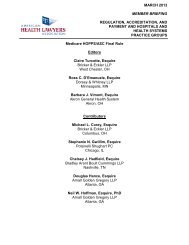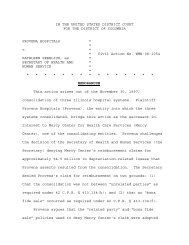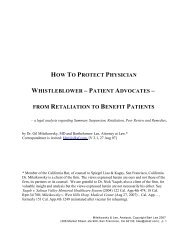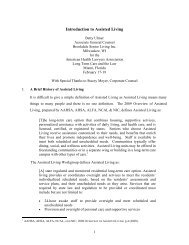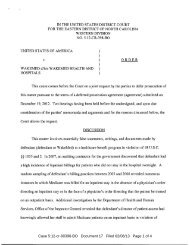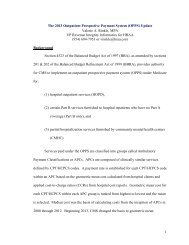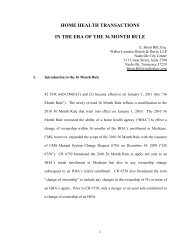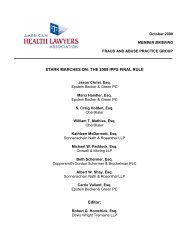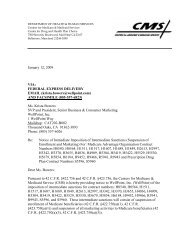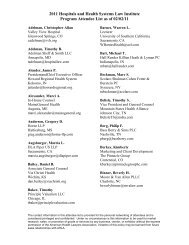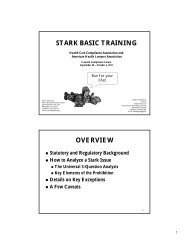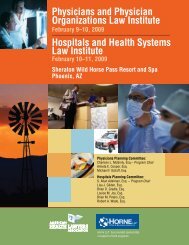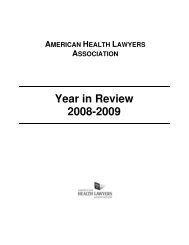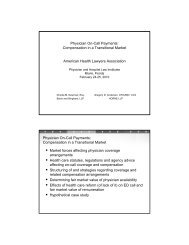Medical Necessity - American Health Lawyers Association
Medical Necessity - American Health Lawyers Association
Medical Necessity - American Health Lawyers Association
You also want an ePaper? Increase the reach of your titles
YUMPU automatically turns print PDFs into web optimized ePapers that Google loves.
Special Presentation and Discussion:<br />
Practice Variation and <strong>Medical</strong> Neccesity<br />
Speaker:<br />
John E. Wennberg, MD, MPH<br />
Director, Center for the Evaluative<br />
Clinical Sciences<br />
Peggy Y. Thomson Professor for the<br />
Evaluative Clinical Sciences<br />
Dartmouth <strong>Medical</strong> School<br />
Hanover, NH<br />
After lunch the facilitator introduced<br />
John E. Wennberg, MD,<br />
MPH, physician and an epidemiologist,<br />
for a special presentation<br />
and discussion with the panel on<br />
his research on unwarranted variations<br />
in medical treatment—and<br />
the potential for applying certain<br />
findings from that research to the<br />
development of a broad policy<br />
approach to addressing medical<br />
necessity. The panel discussed<br />
both Dr. Wennberg’s findings and<br />
an innovative proposal he subsequently<br />
offered that would link his<br />
research to the Colloquium<br />
panel’s evident interest in policy<br />
changes that would forge a partnership<br />
between patients and<br />
physicians in making treatment<br />
decisions with implications for<br />
medical necessity determinations.<br />
This article summarizes Dr.<br />
Wennberg’s luncheon presentation<br />
as well as the panel’s discussion of<br />
his innovative proposal. That<br />
discussion mostly occurred during<br />
the session that immediately<br />
followed his presentation. (See,<br />
“Stakeholders’ Concerns with the<br />
<strong>Medical</strong> <strong>Necessity</strong> Claims<br />
Adjudication Process—and<br />
Suggested Solutions,” on pages 17-<br />
20.) Recognizing that time did not<br />
permit a full discussion of Dr.<br />
Wennberg’s concept, a <strong>Health</strong><br />
<strong>Lawyers</strong> leader suggested at the<br />
end of the Colloquium that the<br />
Public Interest Committee work<br />
with him to further develop the<br />
proposal in the months ahead and<br />
to share that work with the<br />
Colloquium panel. Dr. Wennberg<br />
graciously agreed.<br />
Dr. Wennberg’s Presentation<br />
Dr. Wennberg and his colleagues<br />
at the Center for the Evaluative<br />
Clinical Sciences have developed<br />
the Dartmouth Atlas Project<br />
(“Atlas”), an ongoing study of the<br />
patterns of practice for beneficiaries<br />
enrolled in traditional fee-forservice<br />
Medicare. The Atlas is the<br />
culmination of fifteen years of<br />
research on the variations in<br />
medical treatment provided<br />
among 306 “hospital referral<br />
regions,” which are aggregates of<br />
smaller hospital service areas (see<br />
Exhibit 1).<br />
Dr. Wennberg explained that<br />
researchers at Dartmouth have<br />
defined three major categories of<br />
medical services as a useful way of<br />
viewing unwarranted variations in<br />
treatment. Variations are judged<br />
“unwarranted” if they cannot be<br />
explained on the basis of illness,<br />
patient preference, or evidencebased<br />
medicine. The three categories<br />
can be distinguished on the<br />
basis of the relative importance of<br />
four factors in clinical decision<br />
making: medical evidence, clinical<br />
theory, patient preferences, and<br />
the local supply of healthcare<br />
resources. The categories of<br />
unwarranted variations in medical<br />
treatment are effective care, preference-sensitive<br />
care, and supplysensitive<br />
care. 1 Dr. Wennberg<br />
explained each category as follows:<br />
Effective Care<br />
This category refers to services<br />
whose use is supported by wellarticulated<br />
medical theories and<br />
by strong evidence of efficacy in<br />
the form of randomized clinical<br />
trials or well-conducted cohort<br />
studies. There are no trade-offs for<br />
effective care—the benefits far<br />
exceed the risk. “These are the<br />
kinds of things that you could<br />
write rules about,” Dr. Wennberg<br />
explained. “If everybody has X<br />
they should get Y. If they have a<br />
heart attack, they should get a beta<br />
blocker. Or, if they’re in a certain<br />
age group, they should get an<br />
immunization.”<br />
Preference-Sensitive Care<br />
This category refers to services in<br />
which the medical decision<br />
involves a choice between at least<br />
two treatments with differing risks<br />
and benefits. Sometimes, the<br />
options are supported by strong<br />
evidence of efficacy. Examples<br />
include, Dr. Wennberg explained,<br />
whether to perform a lumpectomy<br />
or a mastectomy for breast cancer<br />
patients, or, in the case of certain<br />
non-cancerous prostate conditions,<br />
whether to carry out procedures<br />
where the trade-offs may be incontinence<br />
or loss of sexual function.<br />
Sometimes, the treatment decision<br />
must be made in the face of<br />
considerable scientific uncertainty<br />
about the outcomes of care—for<br />
example, the choice of surgery or<br />
conservative management for lowback<br />
pain.<br />
13


